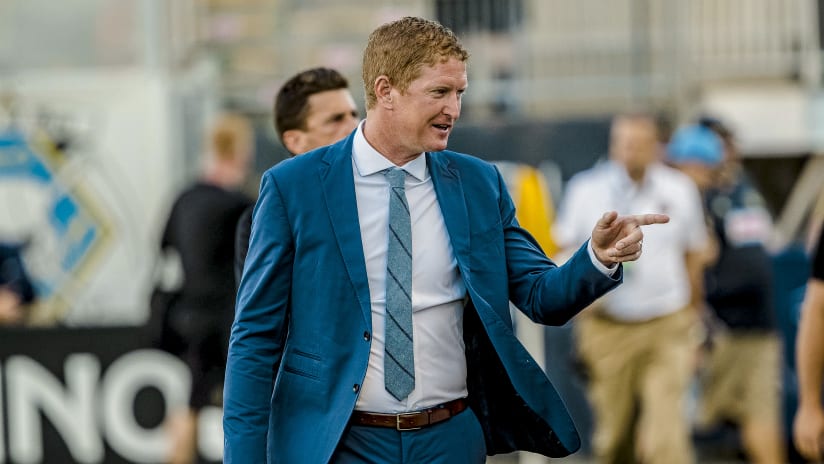At Princeton, at least back in the mid-90s, prospective students went through an individual interview after they were accepted.
‘He'll make a good coach someday because he talks like a coach.’ Jim Curtin’s interviewer wrote after their meeting. That man recently sent Curtin his handwritten notes from that day after finding out what the Union head coach was up to these days.
Curtin laughed as he reflected on that interview with KYW Newsradio’s Matt Leon. “This is when I was 17, and an idiot — literally!”
There are obvious lessons to take from that moment in Jim Curtin’s life. First, that the tall, quick-witted Philadelphian has had a clarity about where his powers lie, even if he could not always express his vision as precisely as now. And second, that those around him could feel that clarity and often respond to it. Both of these lessons help explain why, in his years as the Union head coach, Curtin has remained stubbornly committed to the principles he believes in, and to the players in his locker room. Now in his fifth year, the former Chicago Fire defender has earned respect throughout the coaching community (it is no coincidence Gregg Berhalter looked to Curtin’s staff when filling out his own for the US Men’s National Team) and has grown into what he would agree is a far better leader than he was when he accepted the Union job back in 2014.
“I always equate it to an astronaut going to the moon for the first time,” Curtin told Leon. “You can do all the training and preparation you want but until you go on that first one, that's the first time you have a frame of reference for what it's really like.”
MORE: Curtin's love of Philadelphia
Another, less apparent, lesson hidden in the Princeton story comes into focus when you step back and ask why Curtin stayed local, attending Villanova University instead of the place his future coach with the Fire, Bob Bradley, both went to school and coached. It’s a lesson about balancing ambition and love, and it’s the same lesson that explains how Curtin put himself in a position to become the youngest head coach in Major League Soccer, when John Hackworth was fired and following a sluggish start to the 2014 season.
“To be quite blunt with it,” the Union head coach said recently, “I wanted to position myself to save my parents money.” Villanova offered a full ride; Princeton did not.
The same lesson explains why, years later, Curtin returned to Philadelphia not as a member of the inaugural Union squad, but as an academy coach. Coming off a playoff run with Chivas USA, the Curtins wanted to return to Philly and join the city’s newly formed MLS franchise. There were visions of a leadership role in back, with Jim walking out as one of the first players to represent Philadelphia in Major League Soccer.
What Curtin got was quite different; the youngest kids in the Union academy. “Quite literally 18-month olds to three-year olds was my first class that I got assigned,” he told Leon. “I was playing the equivalent of a red-light-green-light game and they're blasting balls at me and, literally, two months prior, I just got off the field in a playoff loss to David Beckham and the LA Galaxy.”
Just as when he chose Villanova over Princeton for the sake of his parents, Jim Curtin tempered his personal ambition in favor of family. He didn’t want to be moving club to club, city to city, as he and his wife began raising children. And that ability to pursue personal goals in an unselfish way may be the most important lesson Jim Curtin’s career provides. It is the one that explains why Curtin’s locker rooms stick beside him — and together — through thick and thin, and it explains why his coaching staff, all ambitious in their own right, can trust he will provide them the freedom to develop and chase their own dreams.
In recent years, that staff has included BJ Callaghan, now with the US Men’s National Team; Hoffenheim’s Dick Schreuder; Oka Nikolov, who wanted to return to Philadelphia after a stint in Los Angeles; Mike Sorber, now playing a key role with league leaders LAFC; and Pat Noonan, whose name surfaces whenever a MLS head coaching job opens up.
“I think we're in a situation now where you have Pat Noonan, you had Dick Schreuder, you have Oka Nikolov: All three guys are ready to become head coaches,” Curtin says. “I'm spoiled, and it's tough because you know you're going to lose some of these guys because they're ready and they're going to be interviewed for positions that open up.
“But you have to be unselfish; step back and cut the cord and say they're ready to go.”
When Schreuder’s brother was named head coach at Hoffenheim, the Dutch assistant said his experience on Curtin’s staff pointed to a culture of trust that the head coach admits he has worked hard to both institute at the club and adopt in his own interactions.
“I look at this coaching staff,” Schreuder reflected. “Pat, Oka, BJ Callaghan and Tim Hanley last year — all honest, direct people. We all help Jim how we can, and he gives us freedom. And that's what makes him a great manager."
Curtin would never call himself great (“We joke with him all the time: He's the worst self-promoter in the world,” Callaghan says). “I think the biggest steps in coaching haven't been on the field or tactical or substitutions,” the head coach says of his personal development, “It's been learning how to delegate and trust people.
“It's a hard thing for a leader to grasp and do well, but you have to empower others, otherwise they lose interest. I think trusting them with certain parts of training sessions or scouting, stepping away and letting them run things.
“I used to be very hands-on and run every second of every training session. But as you step back, I think often I didn't have a good vision of how the players were performing each week. It was: yes, that was a good training session that we ran, but you're so focused in that you don't even recognize which guys played well.”
Now the assistant coaches often direct the training sessions while Curtin observes and jumps in when necessary. The assistants also drop a scouting report for the next opponent on the head coach’s desk as soon as the previous match ends. They debate how to train the team and how to break down film into digestible chunks for the players. In the buildup to a match, a fifty page report gets whittled down to a half-dozen key principles, film is enhanced with computer software, physical specifications for each training session are outlined.
“How many reps, at what speed, how much distance are they covering?” Curtin ticks off a near-endless list of duties. “The assistants are responsible for all this stuff!”
He chuckles, “I'm making it sound like I don't do anything anymore! It's gotten to the point where things start to self-manage: The sports performance department manages itself, the scouting department is able to manage itself, data analysis does its thing.
“As a coach, the hours that these guys put in: It's 24-hours a day. You're always thinking about it, always texting each other, watching games, stealing set pieces. We see a good set piece in a game: Somebody clip that!
“The dialogue is 24/7 with the coaches; you always have to be on. It's stressful, and it's stressful for families. But at the same time: It's the best job in the world.”













